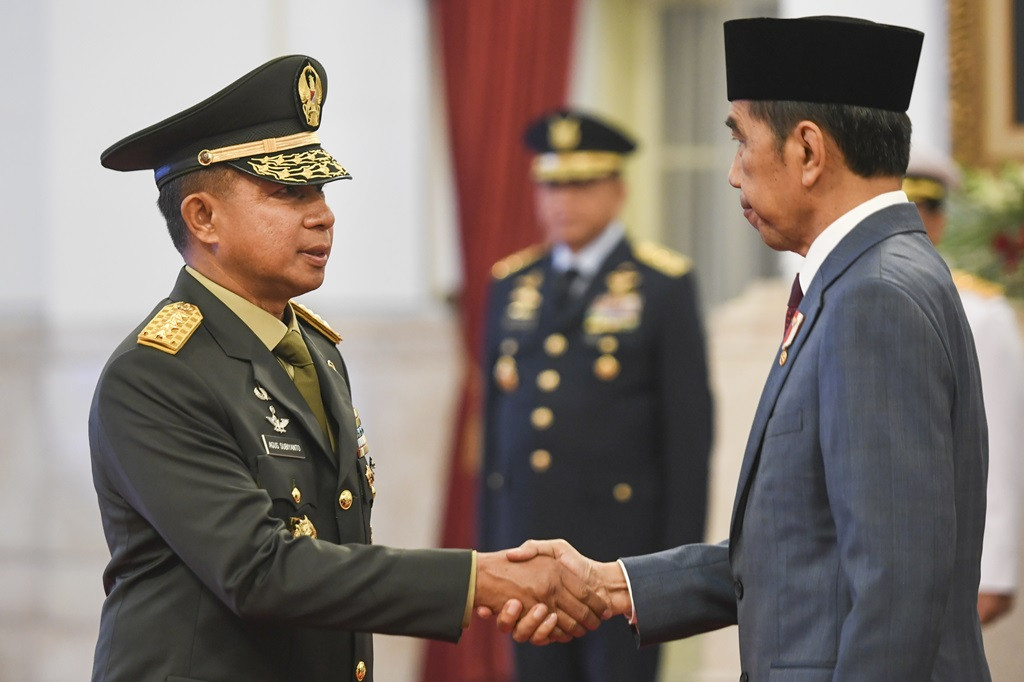Popular Reads
Top Results
Can't find what you're looking for?
View all search resultsPopular Reads
Top Results
Can't find what you're looking for?
View all search resultsNew patrimonialism
After all, we already have three candidate pairs registered with the General Elections Commission (KPU), which is expected to officially announce later this week that the three are eligible to run.
Change text size
Gift Premium Articles
to Anyone

The New Order regime has only been gone for a quarter century and with Indonesia preparing for another general election next year, we have every reason to believe that everything is moving in the right direction.
After all, we already have three candidate pairs registered with the General Elections Commission (KPU), which is expected to officially announce later this week that the three are eligible to run.
Yet, however optimistic we are with the prospect of the election and the ongoing reform movement, now seems to be the right time to look back on what went wrong with the New Order regime.
Soeharto’s brand of authoritarianism embraced the ruthless efficiency of what scholars refer to as a patrimonialist system, under which the strongman extensively utilizes patronage to ensure the loyalty of his subordinates and top members of the national elite, while also applying formidable coercive powers as the supreme commander of the military (and its massive intelligence apparatus).
The New Order regime collapsed from the inside when Soeharto no longer had the economic resources to bribe members of the Jakarta elite – thanks to the late 1990s financial crisis – and when the fractious military decided to step away from his murderous intent.
Patronage and the application of the state’s coercive power remained a fact of life under the reform, but politics has been so fractious in the current multi-party system that no political leader had been able to make effective use of both until President Joko “Jokowi” Widodo came along.

Now, after two terms in office, we face the prospect of a full comeback of the patrimonialist practices of the New Order.
Much has been said about the distribution of resources to national elites who have allied themselves with the President. The President’s downstreaming initiatives and his massive infrastructure drive has certainly provided enough spoils for some of his supporters to reap the benefits.
Recent developments, however, should worry us. The country might be entering what Max Weber describes as the extreme form of patrimonialism – something that some dub as ‘sultanism’ – in which “traditional domination develops an administrative and military force that are purely instruments of the master.”
And as the country enters the next stage of the general election process, we could say that administrative and military forces—including the National Police—have been turned into political instruments.
With President Jokowi and his son’s political fortunes depending on his coalition winning next year’s presidential election, it is easy to see where today’s machination on who controls the Indonesian Military (TNI) and the National Police is headed.
Why has the President decided to fast-track the nomination of Gen. Agus Subiyanto as the TNI chief only six days after he was appointed the Army chief of staff?
What if he has been destined for this position since years ago simply because he had a close ties to the President since his days as mayor of Surakarta?
After all, the leadership of the National Police has already been in the hands of another loyalist, whose ties to the President also date back to his stint in Surakarta.
We would like to think that Agus is a professional and well-qualified General to take up the job of TNI commander and that he will honor his oath of office. But in the event of an election-related national emergency next year, will he forgo his close ties to the President?
We should not even have to ask this question, as the military has throughout stayed above politics throughout the reform and has remained neutral in multiple elections.
That tradition should remain.










